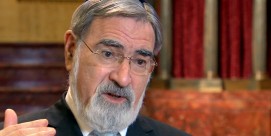In This Episode << SLIDE LEFT TO SEE ADDITIONAL SEGMENTS
Michael Walzer on War
Religion & Ethics NewsWeekly associate producer Noelle Serper interviewed Michael Walzer, UPS Foundation Professor of Social Science at the Institute for Advanced Study in Princeton and the author of many books on war, political theory, and liberal thought, on March 25, 2009 in Baltimore about Afghanistan, exiting Iraq, the moral lessons of war, and religious commentary on U.S. foreign policy.
One of the things we’ve learned, I think, is that even when you fight an unnecessary war, as I think this one [Iraq] was—and unnecessary wars are also unjust wars—even when you fight a war like that you acquire responsibilities in its course, so that when you start thinking about how to get out, as we are now doing, you have to make sure that you do it in ways that don’t put people needlessly at risk and in ways that recognize responsibilities that you have incurred. I recently read an account—actually we published it in Dissent magazine—of how the British withdrew from the American colonies, as an example of getting out, and they were incredibly conscientious. With these little boats from the 18th century, they took out their own soldiers, they took out the Hessian mercenaries, and they took out thousands of loyalist families who had helped them and who would have been not treated well in the new republic. They recognized the responsibility to their loyalists, their collaborators. The rich ones they took to England, the others they only took to Canada. But, still, it took months with these boats going back and forth, and they took out thousands. We did not do that in Vietnam. We left many, many people behind who were killed by the communists or who became boat people, with all the risks that that entailed. The French did not do that when they left Algeria. They left behind people who were killed by the Algerian nationalists. Now we have to leave Iraq in an honorable way, and we have to take out all of the people that we have compromised, and we have to bring them here because we are the ones who put them in danger. So, for me, it’s a very important lesson. Maybe we will have to learn it in Afghanistan also. In Afghanistan, I think, we went in rightly, but we didn’t go in in the right way. We fought a proxy war with warlords as our proxies; we never invested the money in political reconstruction and economic reconstruction that we should have; we didn’t accept help from the Europeans at the beginning when we should have accepted it; we never sent enough people there. And now Obama has inherited a frightening situation which he may or may not be able to turn around. But there are two million girls going to school in Afghanistan because of our presence there. That wasn’t why we went in, but they are—and we can’t just walk away knowing that those girls are going to be, many of them, punished for going to school, and certainly the schools will all close. So you take on responsibilities whether you act justly or unjustly. And there is a certain kind of hard-headed realism which says, “Okay, it’s not in our interests to defend those girls. This is a mess, and we should get out of it,” but that kind of realism, I think, it simply immoral.
There’s now a general problem which has been raised by Israel’s wars in Lebanon and Gaza, and the American war in Afghanistan, and the Sri Lankan war against the Tamil Tigers: How do you fight against these kinds of organizations which use the civilian population as cover quite systematically, and how do you fight against them while maintaining your commitment to minimize civilian casualties? And that’s a very hard question, and we are killing too many civilians in Afghanistan, both from a moral standpoint but also from a political prudential standpoint. We are not winning hearts and minds when we kill men, women, and children who are not Taliban fighters. So we have to figure out how to fight this kind of war. We have to train soldiers. I think we have to learn that when you encounter hostile fire from a building which has Taliban marksmen on the roof and families locked into the first and second floors that you don’t pull back and call in an air strike. Maybe you just pull back and try to get the bad guys another day. But that has now become the crucial problem of how you engage—what kinds of risks can you ask your soldiers to take in order to reduce the risks we impose on civilians?
We’re not fighting wars like World War II, either in Europe or the Pacific, or like Korea. We’re not bombing cities. We’ve learned, I think, that that’s not a smart thing to do. But, also, there aren’t conventional battlefields in these wars, and that’s an issue. Even in Vietnam, where there were certainly, sometimes, maybe often, American soldiers would draw fire from a village where the Viet Cong guerillas were mixed up with civilian inhabitants. But there were also real firefights in the jungle that were just between soldiers, and that isn’t happening in Afghanistan. Almost all the battles are in villages where the civilians are there alongside the people we are fighting against. So I think we learned, crucially in Vietnam we learned that you have to win hearts and minds if you’re going to win this kind of a war. But how to do it? How to do it against enemies who are quite determined that civilians ought to die because it makes their enemies look bad, and who deliberately put civilians at risk in order to force the American soldiers or the Israeli soldiers or the Sri Lankan army to kill civilians? And you have to find a way not to do that.
I don’t think religion should have any role in the way the American government shapes its foreign policy. We have to learn something about—if we encounter religious fundamentalists or religious zealots as fighters, we have to learn how to fight them. But religious considerations are not part of U.S. foreign policy. They are part of the commentary on U.S. foreign policy, as when the Catholic bishops issue an encyclical about nuclear deterrence, or about the war in Iraq. Religious figures, speaking from a religious perspective, have a quite legitimate role in shaping public opinion about these activities, and the Catholics—because just war theory is originally a Catholic theory—they have been very active in talking about these questions. But an American president makes secular decisions in terms of national interests and national values.







